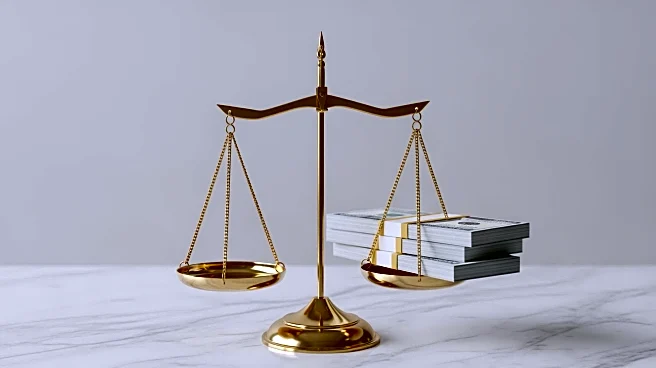What's Happening?
President Trump announced a plan to provide a $2,000 tariff dividend to every American, excluding high-income individuals. This announcement follows the Supreme Court's questioning of the legality of Trump's use of emergency powers to impose tariffs on nearly
every country. Trump claims the tariffs have generated trillions of dollars and have not caused inflation, despite skepticism from GOP lawmakers and the Supreme Court. Treasury Secretary Scott Bessent indicated that the dividends might not be direct payments but could come in various forms, such as tax decreases. The U.S. has collected approximately $151 billion from import duties between April and October, with expectations to collect $500 billion annually.
Why It's Important?
The proposed tariff dividend could have significant implications for U.S. economic policy and public sentiment. If implemented, it may provide financial relief to Americans, potentially boosting consumer spending. However, the legality of the tariffs is under scrutiny, and the Supreme Court's decision could impact the administration's ability to continue imposing them. The tariffs aim to rebalance trade and bring manufacturing jobs back to the U.S., but they have also raised concerns about potential economic disruptions and increased costs for consumers. The outcome of the Supreme Court case could influence future trade policies and economic strategies.
What's Next?
The Supreme Court is expected to deliver a decision on the legality of Trump's tariffs by next June. If the court rules against the tariffs, the administration may need to explore alternative trade measures or refund collected tariffs. GOP lawmakers have expressed skepticism about the feasibility of direct payments, citing concerns over national debt. The administration may face challenges in implementing the dividend plan, especially if the Supreme Court decision limits tariff powers. The political and economic ramifications of this decision could shape future trade negotiations and domestic economic policies.
Beyond the Headlines
The use of tariffs as a negotiation tool in foreign policy, including efforts to end foreign wars, highlights the broader strategic implications of Trump's trade agenda. The legal challenges to the tariffs underscore the tension between executive powers and judicial oversight. The potential for refunds if the tariffs are deemed illegal could have significant financial implications for the government and businesses affected by the tariffs.
















